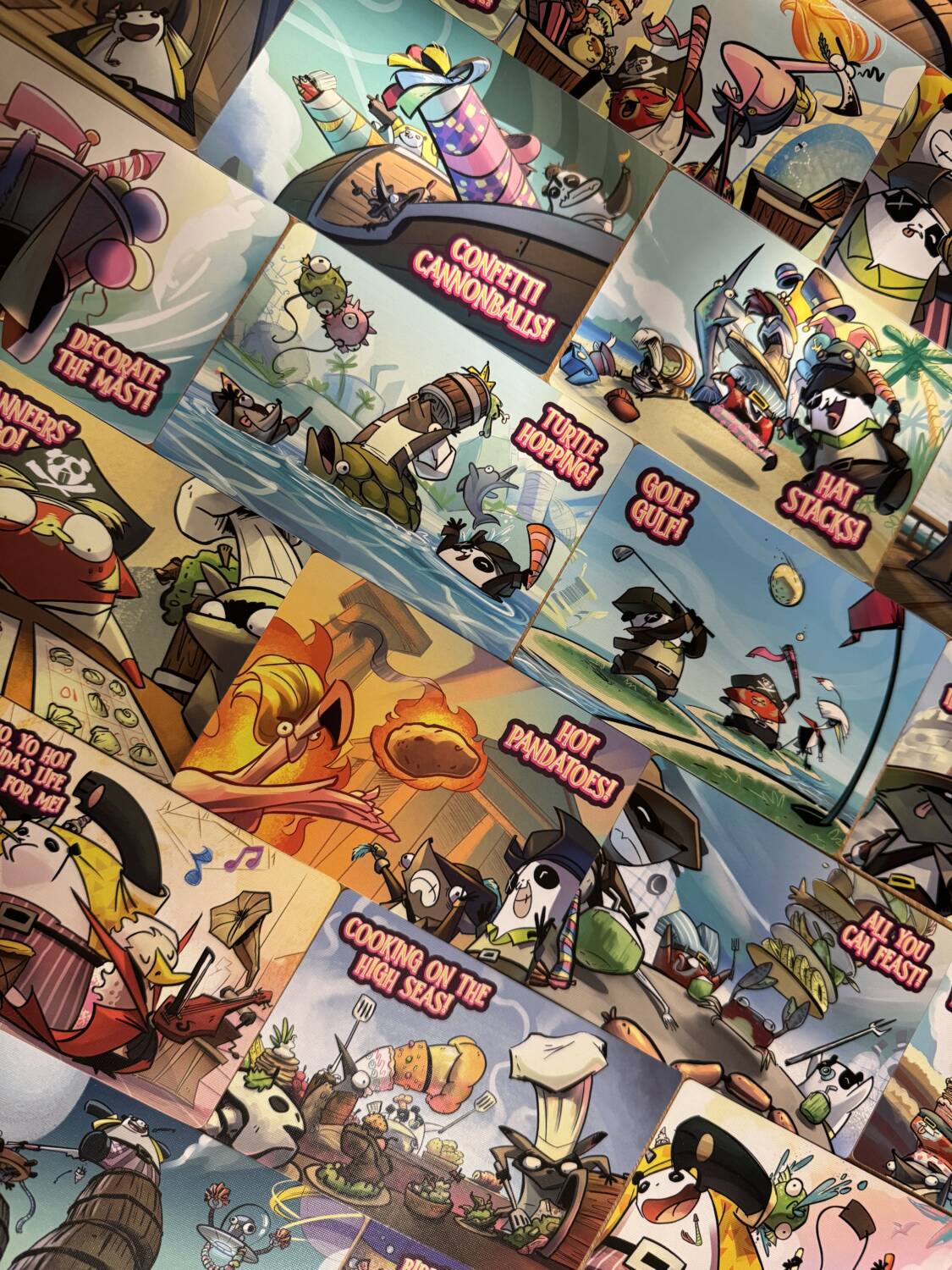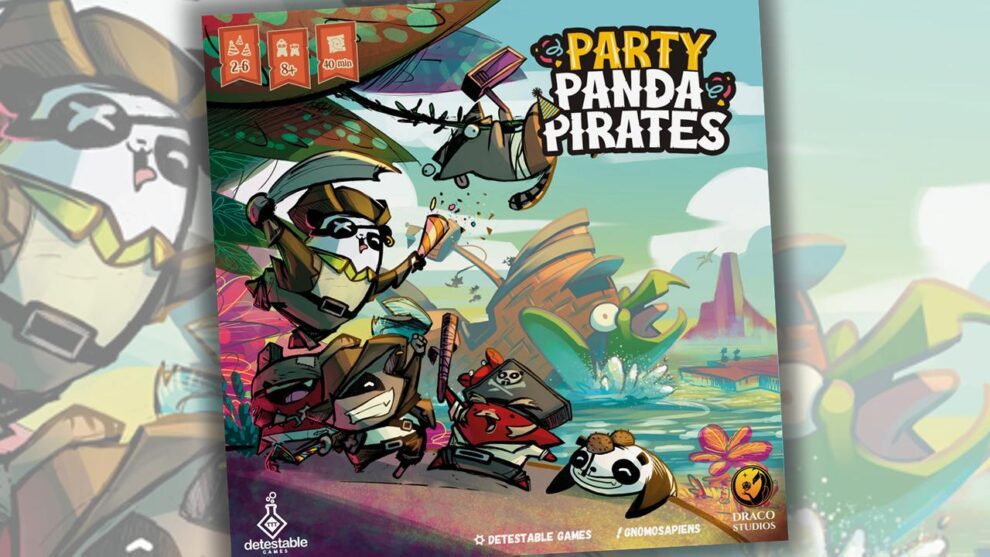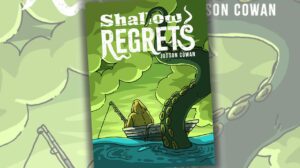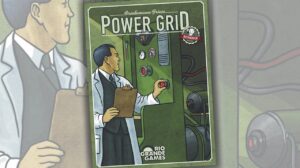Disclosure: Meeple Mountain received a free copy of this product in exchange for an honest, unbiased review. This review is not intended to be an endorsement.
Mario Party enthralled my family when it was originally released on the Nintendo 64 back in 1998. It became an instant hit, inundating us in the roll-and-move minigame franchise for years to come. Because of its success, it’s no surprise that a designer would come along and convert the concept to the tabletop gaming scene. Enter Party Panda Pirates, a game whose most difficult feature is pronouncing its p-alliterative title in the correct order. Does it serve as a passable homage to its inspiration? Read on to find out.
Party Panda Pirates Overview
In Party Panda Pirates, players assume the roles of panda pirates sailing their turtle ship, scouring the seas for parties. Over the course of six rounds, players compete in an assortment of minigames, gaining coins and chests in their goal to accumulate the most Chests and win the game.
Each turn, players will take one of their pirate panda meeples and send it through the turtle ship which doubles as a chute. You point the ship towards an island that has minigame cards that you might want to play. Whichever island receives the most meeples will be the one that the Captain—the last player to have attended a kids’ party—chooses the minigame from. Additionally, any meeples lying in the center circle of an island receive a 1 coin bonus for their skillful accuracy (or lucky ricochet).
Once the Captain chooses the minigame, the fun really begins. The game ships with 24 minigames, whose rules are easily accessible in the included Navigation Log booklet. What’s even better is that each game card includes a QR code that will take you to a short YouTube tutorial that explains the game’s rules. You know that pregame screen in Mario Party before the minigame begins where you can initiate a practice round? It’s that exact idea.
Before engaging in the minigame, players will get to bid on who they think will win or lose the game, depending on whether the card has a green thumbs up or a red thumbs down. Anybody who is correct, gains a coin, which is a good way to make progress in the game even if you’re not the best at some of the activities.
The minigames have assorted levels of dexterity-based, luck-dependent, or strategic-thinking challenges. For example, you might set up a game where you have to lift a stack of four dice around the archipelago of islands using just your pinky fingers. Or you might have a game that’s essentially a truncated version of bingo. Some are better than others, but having a decent pool of games means that you’d have to play a minimum of four games to experience them all for the first time.
Based on the results of the game, players place their panda meeples on the associated ranking spaces, granting a decreasing range of bonuses for their placement. Players then roll the die to determine how many spaces they move, traveling around the pirate hat-shaped board to gather Chests and coins. Landing on a black space will give an extra coin, just like blue spaces in Mario Party, and red spaces have the chance that you need to pay a coin penalty.
Six rounds of games later, whoever has the most Chests wins the game!
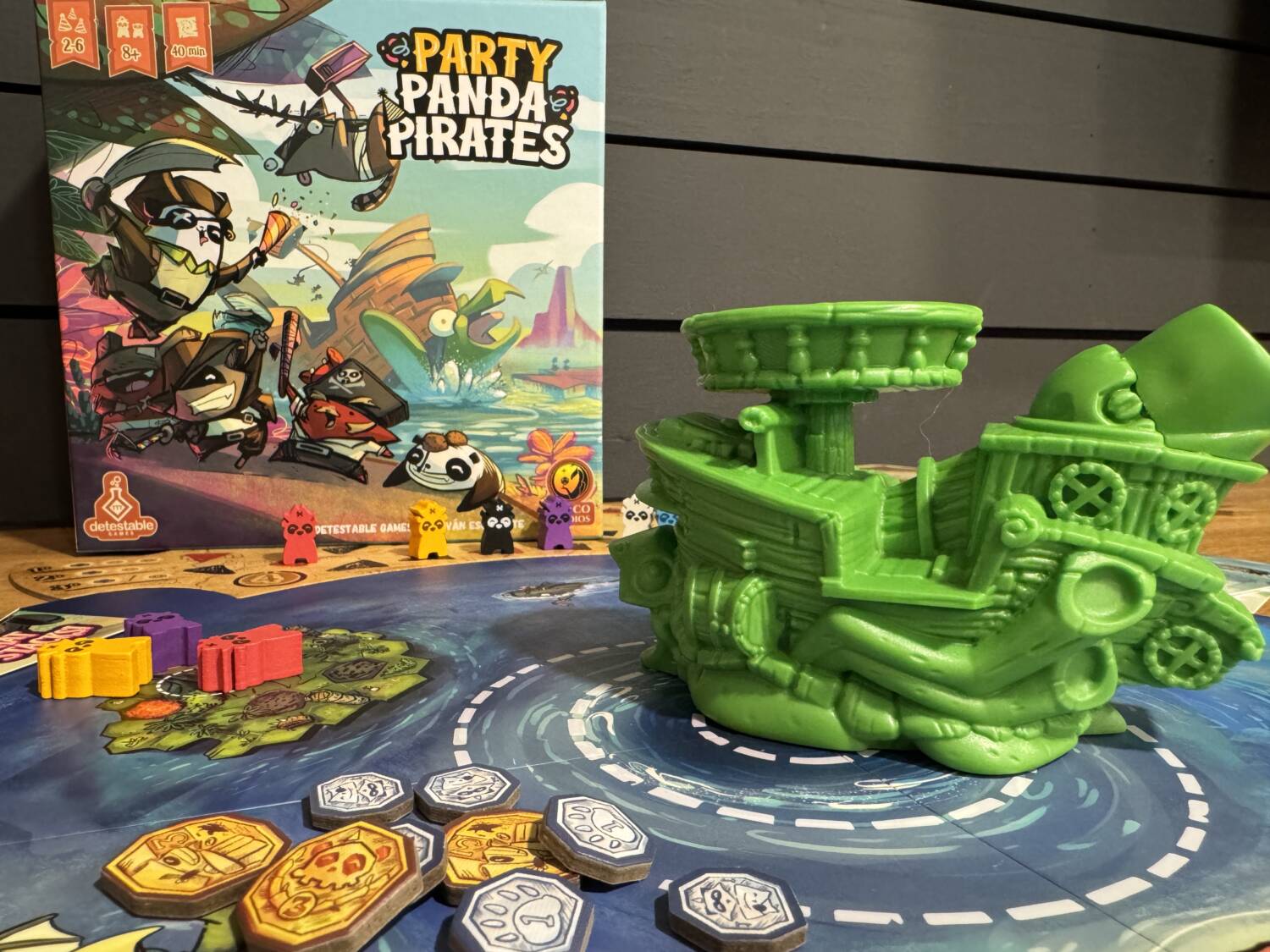
Party Panda Pirates: Sea-Faring Fun
In Mario Party, we would always try to play games of 50 turns, turning our gaming session into more of a marathon that often outstayed its welcome. Party Panda Pirates plays in less than an hour, even when learning the minigames for the first time. This makes it a great choice to experience the chaotic joy of the genre without committing an entire afternoon to the experience.
The production quality of the game is superb. I love the mechanics of sliding meeples through the turtle ship in hopes of landing them on target—a feat that is more difficult than it initially appears. All the games can be played with a deck of square cards, dice, an included timer, and the meeples. I also give the Draco Studios team props for including a functional insert that allows the game to be put away easily and orderly.
Dexterity games aren’t for everyone, so I appreciate that there is a mix of minigames of differing styles. At the same time, it does feel like maybe half of the games do have a dexterity element, so keep that in mind if your group doesn’t go for that sort of thing. Party Panda Pirates thrives on the controlled chaos and hilarity that stems from making mistakes and successfully navigating its inventive challenges.
As with its analogous video game counterpart, there is inherent luck required to win. If you don’t roll the right numbers on the dice to acquire Chests, it can be much harder to secure a victory. However, I do like that Coins can help mitigate some of that misfortune, as you will acquire Chests for 7 coins at the end of each round in addition to whatever you collect from movement on the board. If you’re adept at guessing winners/losers or can expertly land your pirate panda meeple on the islands, you remain a contender regardless of dice luck or taking the top spot in minigames. And, no, you cannot bet on yourself to win or lose.
There’s a lot of replayability in Party Panda Pirates, and the play is much more fluid when you already know the minigames that come up. On your first few plays, the game does a lot of starting and stopping as you learn the rules for the Captain’s choice of game each round. Some of these minigames, like Turtle Hopping, also have a lengthy setup which dampens the flow of the game. For this reason, I find that this game excels the most once you have a few plays under your belt, or play with someone who has.
Overall, Party Panda Pirates captures the core essence of what I love about minigame-based party games. It’s primarily geared towards older gamers, but I can see how kids would enjoy the turtle ship—most of the games are fairly approachable for kids 8+ years old. It is a refreshing inclusion into the rotation for my casual gaming group that doesn’t care much for the latest big box strategy affair. It’s an engaging game for a relaxed atmosphere that doesn’t take itself too seriously. It’s the ideal game for generating laughs on the high seas—A Premier Present of Pithy Pizazz.
